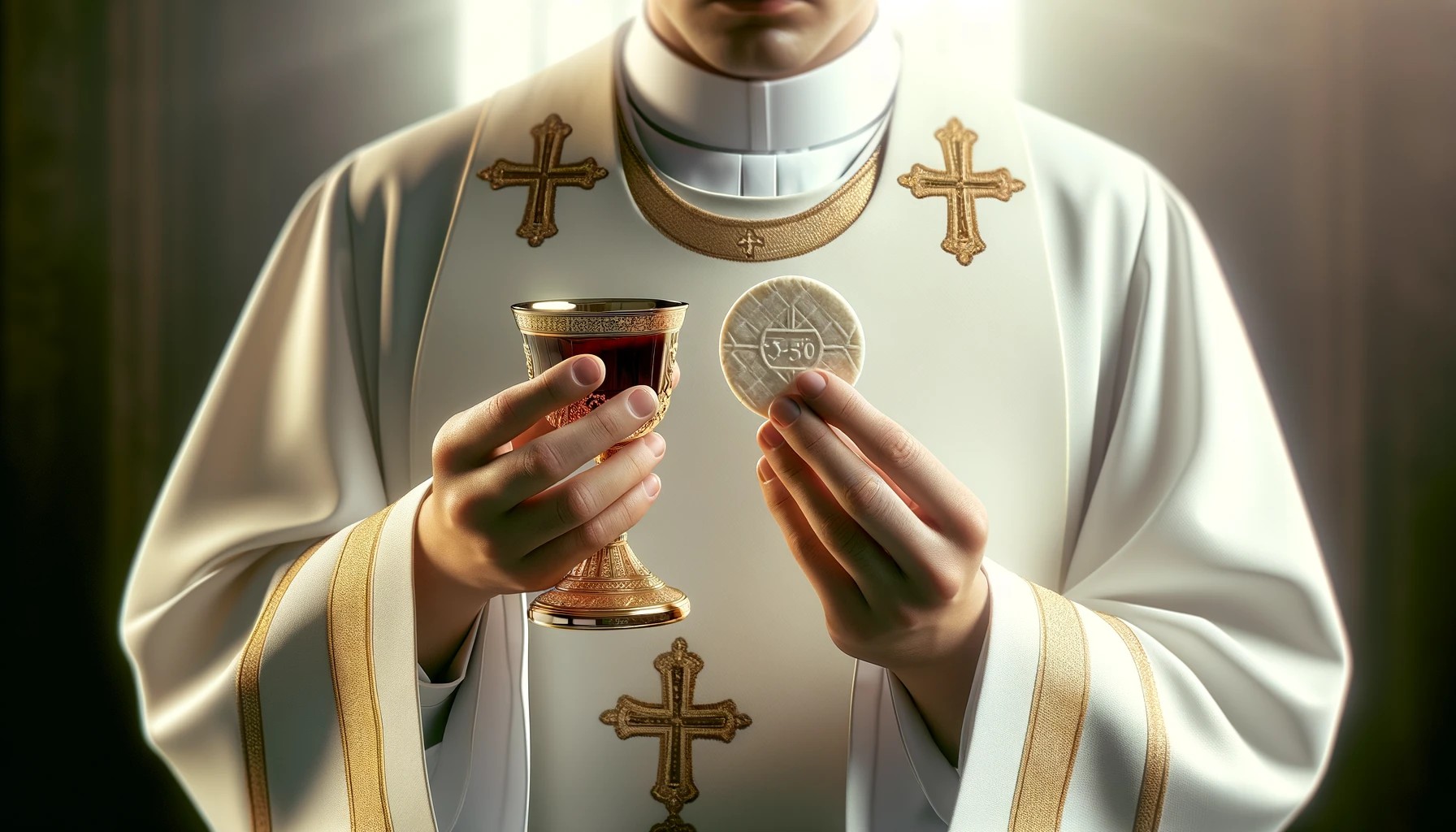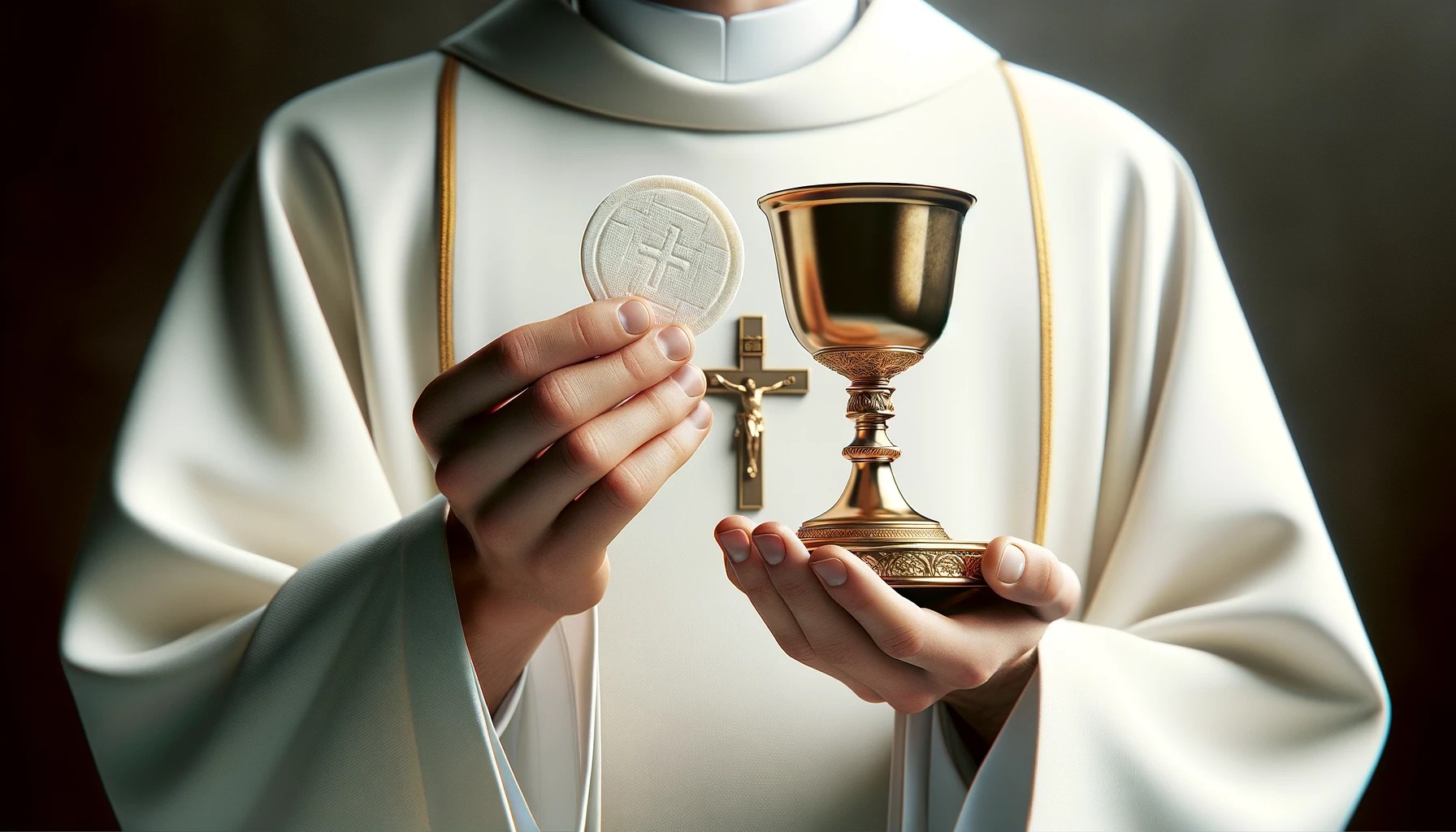Home>Theology and Spirituality>Who Can Administer Holy Communion


Theology and Spirituality
Who Can Administer Holy Communion
Published: February 25, 2024
Ericka Andersen, an editor at Christian.net, expertly merges digital strategy with content creation, focusing on faith and societal issues. Her communication skills enhance the platform's engaging narratives, fostering meaningful dialogue on belief's impact on society.
Learn about the theology and spirituality behind the administration of Holy Communion and who is qualified to perform this sacred ritual. Gain insights into the significance and practices of this revered sacrament.
(Many of the links in this article redirect to a specific reviewed product. Your purchase of these products through affiliate links helps to generate commission for Christian.net, at no extra cost. Learn more)
Table of Contents
Introduction
The administration of Holy Communion, also known as the Eucharist, is a sacred and revered practice within the Christian faith. It symbolizes the sharing of the body and blood of Jesus Christ and holds profound spiritual significance for believers. The act of administering Holy Communion is a solemn responsibility, and it is essential to understand who is entrusted with this sacred duty.
In the Catholic and Orthodox traditions, the administration of Holy Communion is primarily carried out by ordained clergy, including priests and deacons. However, in certain circumstances, lay ministers may also be authorized to administer the Eucharist. Understanding the roles and responsibilities of each of these individuals is crucial in maintaining the sanctity and reverence of this sacramental practice.
As we delve into the intricate dynamics of administering Holy Communion, we will explore the distinct roles of priests, deacons, and lay ministers within the context of the Christian faith. Additionally, we will examine special circumstances that may arise, necessitating a thoughtful and discerning approach to the administration of the Eucharist. By gaining insight into these aspects, we can develop a deeper appreciation for the spiritual significance of Holy Communion and the individuals entrusted with its administration.
Read more: How To Administer Holy Communion To The Sick
The Role of a Priest
Priests play a central and revered role in the administration of Holy Communion within the Catholic and Orthodox traditions. As ordained clergy, they are entrusted with the sacred duty of presiding over the Eucharistic celebration and consecrating the bread and wine, transforming them into the body and blood of Christ. This profound act, known as transubstantiation, lies at the heart of the priest's role in the Eucharistic liturgy.
In the Roman Catholic Church, priests undergo extensive theological training and are ordained through the sacrament of Holy Orders, granting them the authority to act in persona Christi, or "in the person of Christ," during the celebration of the Mass. Through this sacred identity, priests are empowered to lead the congregation in the commemoration of Christ's Last Supper, where the institution of the Eucharist took place.
During the Eucharistic celebration, the priest, vested in liturgical garments, presides at the altar, representing Christ's presence among the faithful. With solemn reverence, the priest consecrates the bread and wine, invoking the Holy Spirit to effect the mystical transformation. This pivotal moment, known as the epiclesis, signifies the sanctification of the elements, making them the true body and blood of Christ.
Following the consecration, the priest distributes the Eucharist to the assembled worshipers, imparting the sacred elements with profound reverence and care. This act of distribution is accompanied by prayers and rituals that underscore the priest's role as a conduit for the spiritual nourishment of the faithful.
Beyond the Eucharistic celebration, priests also serve as spiritual guides and shepherds to their congregations, offering pastoral care, administering the sacraments, and providing moral and ethical guidance rooted in the teachings of the Church. Their multifaceted role encompasses not only the administration of Holy Communion but also the broader ministry of nurturing the spiritual well-being of the faithful.
In essence, the role of a priest in administering Holy Communion is imbued with profound significance, embodying the sacred connection between the faithful and the divine. Through their ordained ministry, priests uphold the sanctity of the Eucharist, fostering a deep sense of reverence and spiritual communion within the Christian community.
Deacons and Holy Communion
Deacons hold a distinct and revered position within the hierarchical structure of the Catholic and Orthodox Churches, and their role in the administration of Holy Communion is deeply intertwined with their diaconal ministry. While deacons do not possess the authority to consecrate the Eucharistic elements, they play a vital role in assisting the priest during the celebration of the Mass and in distributing the consecrated bread and wine to the faithful.
During the Eucharistic liturgy, deacons serve alongside the priest, offering support and assistance in various ceremonial aspects of the Mass. Their participation reflects their role as servants of the Church, dedicated to upholding the sacred rituals and ensuring the orderly conduct of the liturgical celebration. This may involve preparing the altar, presenting the gifts of bread and wine, and assisting with the purification of the sacred vessels after the distribution of Holy Communion.
One of the central responsibilities of deacons in the context of Holy Communion is the reverent and dignified distribution of the Eucharistic elements to the congregation. While the priest retains the exclusive privilege of consecrating the bread and wine, deacons are entrusted with the solemn task of assisting in the distribution process, ensuring that the faithful partake of the Eucharist with reverence and devotion.
In some instances, deacons may also be authorized to bring the Eucharist to the sick and homebound, extending the spiritual nourishment of Holy Communion to those unable to attend the communal celebration of the Mass. This pastoral aspect of their ministry underscores the compassionate and inclusive nature of the diaconal vocation, as deacons embody the Church's commitment to caring for the spiritual well-being of all its members.
Furthermore, the involvement of deacons in the administration of Holy Communion serves as a visible reminder of the collaborative and communal nature of the Church's worship. Their supportive role alongside the priest underscores the unity and harmony within the ministerial body, reflecting the shared commitment to serving the spiritual needs of the faithful.
In essence, while deacons do not possess the authority to consecrate the Eucharist, their integral role in assisting the priest during the Eucharistic celebration and in distributing Holy Communion underscores their vital contribution to the sacred liturgy and their dedication to serving the spiritual welfare of the Christian community.
Lay Ministers and Holy Communion
In the Catholic Church, the term "lay ministers" refers to individuals who, while not ordained clergy, are authorized to assist in various liturgical functions, including the distribution of Holy Communion. This practice stems from the Church's recognition of the shared responsibility for fostering the spiritual well-being of the faithful and ensuring the reverent celebration of the Eucharist.
Lay ministers, often referred to as extraordinary ministers of Holy Communion, are appointed by the local bishop or pastor to serve in this capacity. They undergo specific training to prepare them for this important ministry, which includes instruction on the theological and liturgical aspects of the Eucharist, as well as practical guidance on the proper handling and distribution of the consecrated elements.
During the celebration of the Mass, lay ministers may be called upon to assist the priest in distributing the Eucharist to the congregation. This collaborative participation underscores the communal nature of the Eucharistic celebration and reflects the Church's emphasis on shared ministry within the faith community. By actively involving lay ministers in the administration of Holy Communion, the Church reaffirms the integral role of the laity in the life of the Church and their contribution to the spiritual nourishment of the faithful.
The appointment of lay ministers to assist in the distribution of Holy Communion also serves practical purposes, particularly in larger parishes or during Masses with a high number of attendees. Their presence ensures the orderly and reverent distribution of the Eucharist, allowing the faithful to partake in this sacred sacrament with due solemnity and devotion.
Furthermore, lay ministers may also be entrusted with bringing the Eucharist to those who are unable to attend the Mass due to illness or infirmity. This pastoral aspect of their ministry reflects the Church's commitment to ensuring that all members of the faith community have access to the spiritual nourishment offered through Holy Communion, regardless of their circumstances.
In essence, the inclusion of lay ministers in the administration of Holy Communion underscores the collaborative and inclusive nature of the Church's worship, as well as the shared responsibility for fostering the spiritual well-being of the faithful. Their dedicated service in this capacity contributes to the reverent and orderly celebration of the Eucharist, enriching the spiritual lives of the faithful and fostering a deep sense of communal participation in the sacramental life of the Church.
Special Circumstances for Administering Holy Communion
In certain situations, special circumstances may arise that necessitate a thoughtful and discerning approach to the administration of Holy Communion within the Christian faith. These unique scenarios call for a compassionate and pastoral response, ensuring that the spiritual nourishment offered through the Eucharist is made accessible to all members of the faith community.
One such circumstance involves the administration of Holy Communion to the sick and homebound. In instances where individuals are unable to attend the communal celebration of the Mass due to illness or infirmity, the Church recognizes the importance of ensuring that they receive the spiritual sustenance offered through the Eucharist. In these cases, priests, deacons, or authorized lay ministers may be called upon to bring the consecrated elements to the homes or healthcare facilities of those unable to participate in the regular Eucharistic liturgy. This compassionate outreach reflects the Church's commitment to caring for the spiritual well-being of all its members, regardless of their physical limitations.
Additionally, special circumstances may arise during times of crisis or emergency, such as natural disasters or unforeseen disruptions that impact the ability of the faithful to gather for communal worship. In these challenging situations, pastoral leaders may exercise pastoral sensitivity and flexibility in ensuring that Holy Communion is made available to those affected by the crisis. This may involve organizing alternative worship arrangements, such as outdoor Masses or makeshift chapels, where the Eucharist can be celebrated and distributed, providing spiritual solace and sustenance during times of adversity.
Furthermore, the administration of Holy Communion in non-traditional settings, such as hospitals, nursing homes, or correctional facilities, presents unique circumstances that require a considerate and accommodating approach. In these environments, the spiritual needs of the individuals residing or receiving care in these settings are prioritized, and efforts are made to facilitate their participation in the Eucharistic celebration. Pastoral ministers, including priests, deacons, and lay ministers, play a crucial role in ensuring that the Eucharist is brought to these diverse settings, fostering a sense of spiritual connection and communion for those unable to attend regular church services.
In essence, special circumstances for administering Holy Communion call for a compassionate and inclusive approach, ensuring that the spiritual nourishment offered through the Eucharist reaches all members of the faith community, especially during times of illness, crisis, or confinement. By embracing these unique situations with pastoral sensitivity and care, the Church reaffirms its commitment to nurturing the spiritual well-being of all believers, regardless of their circumstances.















